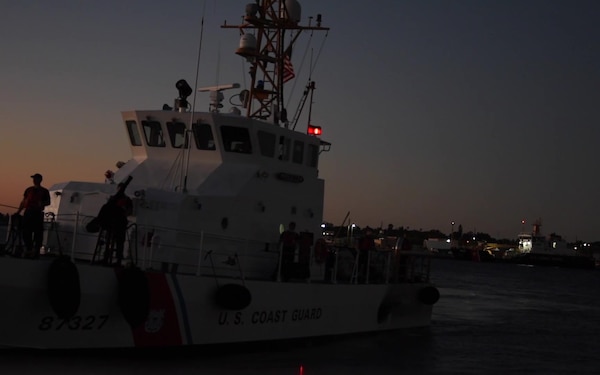Coast Guard offloads about 1 ton of cocaine in St. Petersburg
U.S. Coast Guard sent this bulletin at 11/20/2017 02:21 PM EST
| News Release |
Nov. 20, 2017 |
MULTIMEDIA RELEASE: Coast Guard offloads about 1 ton of cocaine in St. Petersburg
Editors' Note: Click on the photos to download video and high resolution versions.
ST. PETERSBURG, Fla. — The crew of the Coast Guard Cutter Pelican offloaded approximately one ton of cocaine, worth more than $23 million wholesale, and three suspected smugglers Monday in St. Petersburg that was seized in the Caribbean Sea.
While patrolling during Operation Caribbe, Her Majesty’s Canadian Ship (HMCS) Moncton, with an embarked U.S. Coast Guard Pacific Area Tactical Law Enforcement detachment crew, seized more than 834 kgs of cocaine from a suspect vessel Nov. 11 in the Caribbean Sea, south of Jaragua, Dominican Republic. While working under the direction of U.S. Joint Interagency Task Force South (JIATF-S), Coast Guard law enforcement members boarded the go-fast boat and discovered 30 bales of cocaine and apprehended three suspected smugglers.
The contraband and detainees were transferred to RFA Mounts Bay, a Royal Fleet Auxiliary Bay-class auxiliary landing ship dock. The RFA Mounts Bay crew transferred the detainees and contraband to the crew of the Pelican and offloaded at Sector St. Petersburg.
"This offload today is the result of the combined efforts of our partners and allied men and women who continue to work day and night to stop these criminal organizations from profiting off transnational crime and smuggling," said Capt. Aldante Vinciguerra, chief of response, Coast Guard’s 7th District. "This offload represents approximately one ton of illicit drugs that will never hit our streets."
Operation Caribbe is Canada’s contribution to Operation Martillo, a JIATF-S operation, subordinate to U.S. Southern Command (USSOUTHCOM), based in Florida. JIATF-S is a U.S. task force responsible for conducting interagency and international detection and monitoring operations and facilitating the interdiction of illicit trafficking of drugs, weapons, money, and people. As part of Operation Caribbe, the Canadian Armed Forces (CAF) support multinational efforts to address illicit trafficking by providing naval and air capabilities to detect and monitor suspect activities on the water in the Caribbean and off the Pacific coast of Central America.
Numerous U.S. agencies from the Departments of Defense, Justice and Homeland Security are involved in the effort to combat transnational organized crime. The Coast Guard, Navy, Customs and Border Protection, FBI, Drug Enforcement Agency, and Immigration and Customs Enforcement along with allied and international partner agencies play a role in counter-drug operations.
The Coast Guard increased U.S. and allied presence in the Eastern Pacific Ocean and Caribbean Basin, which are known drug transit zones off of Central and South America, as part of its Western Hemisphere Strategy. During at-sea interdictions in international waters, a suspect vessel is initially located and tracked by allied, military or law enforcement personnel. The interdictions, including the actual boarding, are led and conducted by U.S. Coast Guardsmen.
The cutter Pelican is an 87-foot Coast Patrol Boat homeported in St. Petersburg.
The Coast Guard’s Pacific Area Tactical Law Enforcement Team (PACTACLET) is a unit of specially trained law enforcement officers and petty officers who routinely deploy on U.S and allied ship’s on the high seas to combat transnational crime and smuggling operations. PACTACLET is based out of Southern California.
For breaking news, follow us on Twitter @uscgsoutheast.
-USCG-




